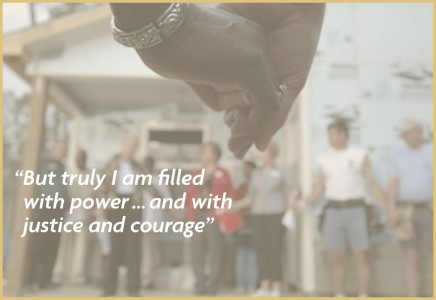The Bible tells us that all life is sacred and justice for the poor is God’s paramount concern. In the Old Testament, God’s commands to end the suffering of the poor was the second only to commands against idolatry. In the New Testament, one out of every 16 verses concerns the poor. We are designed to be stewards of God’s abundant creation, charged with taking care of the earth and protecting life, especially the life of those who are being oppressed. We learn that anything that gets in the way of this is an affront to God.
Historically, the Christian church has viewed the poor as either those lacking in material wealth or those lacking in spiritual health (“Poor in Spirit”). The church is challenged to approach poverty in all of its many facets to help dismantle the very structures that create poverty: physical, social, spiritual, emotional, educational, racial, etc. If we take seriously God’s many promises to the poor, and if we heed God’s strong admonitions to root out injustice, then the church is called to act with serious, well-thought out and dedicated action.
Ending Poverty Resources
General Links
- Voices of Poverty– Read real stories of America’s invisible poor. Voices of Poverty hopes to shed light on the men, women, and children of America’s poverty. The stories from across the country explore why and how people fall into, or remain mired in, poverty—using issues like housing, employment, wages, healthcare access, and education resources as lenses on their conditions. It also points the way to solutions. You can also learn about anti-poverty legislation state-by-state.
- What Does the Bible Say About the Poor (Compassion International) and Economic Poverty (American Bible Society)? A helpful list of key Scriptures.
Community Assessments
As you seek to become a better neighbor and Kingdom witness in your neighborhood and community, it is essential to first create a baseline of understanding about your community’s existing values, needs, dreams, and resources. Community assessments, or community mapping, also help you and your church to engage with community members from different parts of your neighborhood/town/city and will help you to develop a much more holistic and mutual response in addressing needs and issues that you will discover. Here are some assessment tools from various organizations that can help get you started:
- Making Neighborhoods Whole: A Handbook for Christian Community Development, by Wayne Gordon and John Perkins
- Asset-Based Community Development Tookit (Northwestern U)
- Rotary Club Community Assessment Tool
- Dept. of Health & Human Services Community Assessment Kit
Handouts/Articles
Poverty and HT Handout– a brief overview of how human trafficking is a symptom of poverty, as well as statistics on poverty in the United States.
Factsheet on U.S. Poverty (The Poverty Initiative)
Theories of Poverty– excerpt from Ch.1 of Separate Societies: Poverty and Inequality in U.S. Cities, by William Goldsmith, Edward Blakely. A helpful overview of the three predominant theories of poverty. Our assumptions about why poverty exists will ultimately drive the kinds of solutions we pursue. Read pp. 15-21, beginning with “In the first concept, theorists view poverty as personal pathology.”
Why Are We Poor? by Bruce E. Parry– An economic analysis of the root causes of poverty, hunger, and homelessness in the United States.
Immigration Bible Study– A Bible study from the United Methodist Church that uses the “Wesleyan Quadrilateral” (Scripture, Tradition, Experience, Reason) to raise and explore the theological, political, and personal dynamics that surround the conversation around immigration, undocumented immigration, and refugees.
Podcasts/Videos/Audio
The Poverty Tour– a 5-part PBS series on poverty in the United States by Dr. Cornel West and Tavis Smiley.
Photos from VJN Members
If you would like to highlight your church’s anti-poverty efforts in our photo gallery, please email contact@vineyardjusticenetwork.org.

